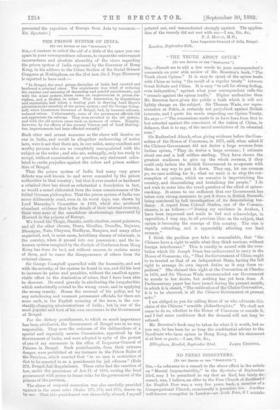THE PRISON SYSTEM OF INDIA. [To Tim EDITOR OF TDB
"STECITATOR."1 SIR,—I venture to solicit the aid of a little of the space you can spare in your correspondence columns, to expose the extravagant
incorrectness and absolute absurdity of the views regarding the prison system of India expressed. by the Governor of Hong Kong, in his address to the Crime Section of the Social Science Congress at Nottingham, on the 21st inst. Sir J. Pope Hennessy is reported to have said :—
" In Bengal, the cruel prison discipline of India had created and hardened a criminal class. The experiment was tried of reducing the number and intensity of degrading and painful punishments, and 'with the wiser system, there came an improvement in prison dis- cipline, and a decline in crime. That Association, by deputations and memorials, had taken a leading part in drawing Lord Mayo's attention to the scandals of the prison system; and Sir George Camp- bell, when Lieutenant-Governor of Bengal, had, by humane reforms, reduced crime. Unfortunately, some of the permanent officials did not appreciate his reforms. They soon reverted to the old system, and with the old system came back an increase of crime. Happily, however, by the efforts of the present Viceroy and of Lord Harting- ton, improvements had been effected recently."
Such utter and arrant nonsense as the above will deceive no one in India, and would be altogether undeserving of notice
here, were it not that there are, in our midst, many excellent and worthy persons who are as completely unacquainted with the -subject as the writer ; and who are, unhappily, only too ready to accept, without examination or question, any statement calcu- lated to excite prejudice against the rulers and prison author- ities of Bengal.
That the prison system of India had many very grave defects was well known to and never concealed by the prison authorities in that country ; but that it ever created or hardened a criminal class has about as substantial a foundation in fact, as would a camel elaborated from the inner consciousness of the fabled German philosopher. That the prison system of India was never deliberately cruel, even in its worst days, was shown by Lord Macaulay's Committee in 1838, which also produced abundant evidence that in the details of their internal economy, there were none of the scandalous shortcomings discovered by Howard in the prisons of Europe.
We found the Thugs, Dacoits, cattle-stealers, secret poisoners, and all the other classes, Dorns, Givallas, Dosadhs, Bujwars, Bhoonyas, Nuts, Cheynes, Sindhyas, Bunyars, and many other organised, and, in some cases, hereditary classes of criminals, in the country, when it passed into our possession ; and the in- human system imagined by the disciple of Confusion from Hong Kong has done its beet, not without success, to reclaim many of them, and to cause the disappearance of others from the criminal classes.
Sir George Campbell quarrelled with the humanity, and not with the severity, of the system he found in use, and did his best to increase its pains and penalties, without the smallest appre- ciable effect in the diminution of crime, that I have been able to discover. He erred gravely in attributing the irregularities which undoubtedly existed to the wrong cause, and in applying the wrong remedy. Hence the reversal of his policy, not by any unbelieving and recreant permanent officials, for there are none such, in the English meaning of the term, in the con- stantly-changing administrations of India ; but by one of the most popular and best of his own successors in the Government of Bengal.
For the dietary punishments, to which so much importance has been attributed, the Government of Bengal was in no way responsible. They were the outcome of the deliberations of a special and especially unwise Commission, appointed by the Government of India, and were adopted in spite of the protest of one of my successors in the office of Inspector-General of Prisons in Bengal. Such punishments, • from their extreme danger, were prohibited at my instance in the Prison Rules of the Province, which enacted that "in no case is restriction of diet to be resorted to as a punishment for jail offences" 278, Bengal Jail Regulations). These rules had the sanction of law, under the provisions of Act II, of 1864, vesting the local government with power to frame rules for the government of the prisons of the province.
The abuse of corporal correction was also carefully provided against in the same rules (Rules 271, 272, and 273), drawn up by me. That this punishment was shamefully abused, I myself pointed out, and remonstrated strongly against. The applica- tion of the remedy did not rest with me.—I am, Sir, Svc., F. J. MOIIAT, M.D.,
Late Inspector. General of Jails, Bengal.
London, September 25 th.


































 Previous page
Previous page